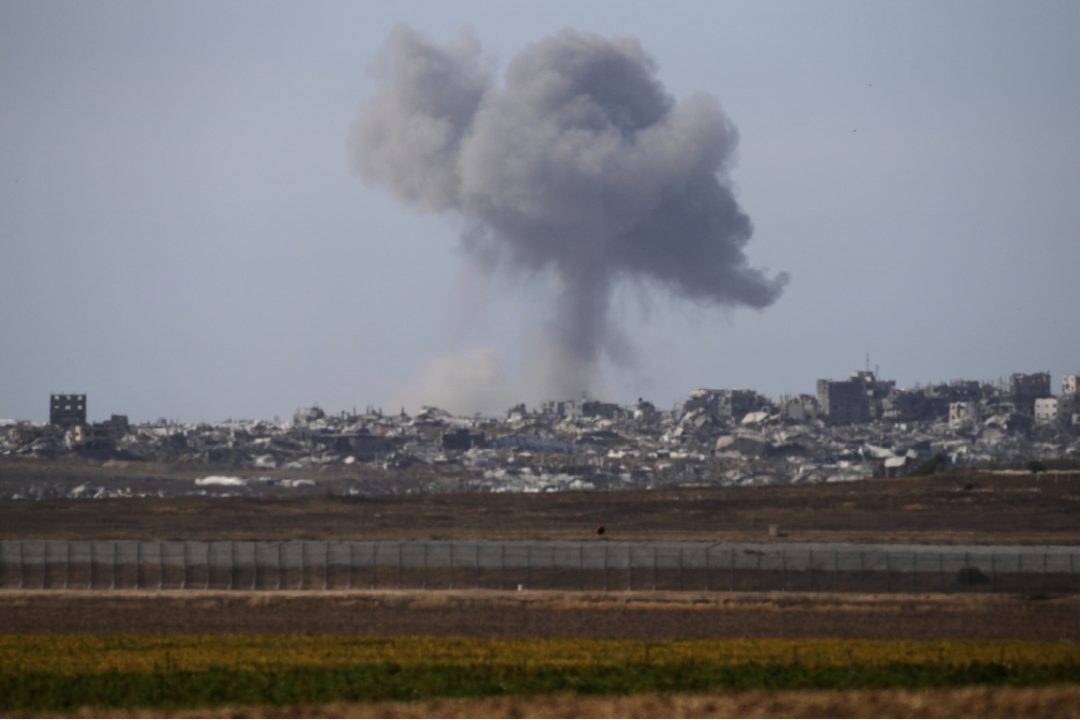
After President Donald Trump left the Middle East on Friday, Israel launched its mission to take over all of Gaza, following through on a promise officials made weeks ago.
Israeli Prime Minister Benjamin Netanyahu said in a video statement on Monday that the aim is total occupation: “The goal of the current expansion of the IDF’s operation in the Gaza Strip is for the IDF [Israel Defense Forces] to take control of the entire territory in order prevent Hamas from looting humanitarian aid,” he said, according to The Jerusalem Post.
Total Blockade
Israel imposed a total blockade around the Gaza Strip on March 2 with the stated agenda of strong-arming Hamas into concessions, including releasing the remaining Israeli hostages. Israel has accused Hamas of siphoning off food and water intended for civilians, allegations backed by U.S. officials and journalists on the ground. Yet the blockade and Israel’s overall campaign to root out what remains of Hamas have undeniably resulted in dire conditions for civilians. Trump said last week that “a lot of people are starving.” Pope Leo XIV said in his inaugural mass, “In Gaza, the surviving children, families and elderly are reduced to starvation.”
Israel has faced intense criticism over the inhumane conditions of the Palestinians, most notably from American college students and the United Nations, two historically untrustworthy sources. But the criticism is crossing ideological and political borders. The issue has taken center stage on several of the most popular media platforms among conservatives, Republicans, and libertarians, including “The Joe Rogan Experience” and Tucker Carlson podcasts. Polls suggest Israel has now lost support even among its most consistently loyal bloc, Republicans. The Pew Research Center found that the portion of Republicans who said they had unfavorable views of Israel rose from 27 percent to 37 percent between 2022 and 2025.
Allowing Aid Again
The Israeli cabinet decided on Sunday night to again allow humanitarian aid into Gaza. On Monday, Netanyahu admitted that decision was, at least in part, a political one. He said it would keep Israel from losing backing among “its closest allies,” including U.S. senators who “support Israel unconditionally,” the Post reported. “We must not let the population [of Gaza] sink into famine, both for practical and diplomatic reasons,” he said. Aid is coming from an American organization and will be doled out at distribution points controlled by the IDF.
Mixed Response
But not everyone in the Israeli government approved lifting the blockade. National Security Minister Itamar Ben-Gvir said terrorists will indeed get their hands on it. He also suggested Netanyahu’s decision is unpopular with the Israeli government. According to the Post:
“The decision, which was made last night in a hasty manner, to renew aid to the entire Gaza Strip, is a serious and grave mistake,” Ben-Gvir said. “We must tell the truth to the public in the State of Israel: This aid … will also fall into the hands of Hamas. That is the reason they refused my request for a vote. That is the reason they knew I had a majority to overturn this decision.”
Religious Zionist Party Chairman and Finance Minister Bezalel Smotrich defended lifting the blockade during a press conference on Monday. In what appears to be a rebuttal to Ben-Gvir, Smotrich said:
No aid will reach Hamas. Period. Anyone who says otherwise is simply lying.… It will allow civilians to eat, our friends around the world to continue providing us with an international protection umbrella at the Security Council and The Hague, and us to keep fighting, God willing, until victory. For two and a half months, we did not allow humanitarian aid into Gaza, creating enormous pressure on Hamas — and rightly so. But pressure must be managed so it doesn’t explode on us.
Destroy Hamas
Israel says the goal is to completely destroy Hamas and free the remaining hostages, of which there may be no more than two dozen, according to reports. More than half of the 251 that were taken on October 7 were rescued or released in prisoner swaps. Dozens of others have died.
Netanyahu’s government has faced accusations that freeing hostages is not a primary concern, including from family members of hostages. Even high-ranking U.S. officials have said Israel’s all-or-nothing approach has negatively affected hostages. Steve Witkoff, U.S. special envoy to the Middle East, negotiated the deal to have the last remaining American hostage released. He said Israel’s refusal to end the war has made it more difficult to bring the captured home.
Nevertheless, Witkoff’s boss has remained supportive. Trump recently told Fox News’ Bret Baier that he’s not frustrated with Netanyahu. There have been some developments and comments indicating U.S. leadership may be cooling on Israel. But, Trump, said he understands the dilemma Israel faces, as Netanyahu “has a tough situation.” He added, “You have to remember, there was an October 7 that everyone forgets. It was one of the most violent days in the history of the world.”
Hamas slaughtered nearly 1,200 civilians on October 7, 2023. They raped and captured hundreds more.
Tragedy abounds on both sides of this war. Making it worse is the notion that it could’ve been prevented, if only high-ranking Israeli officials would have acted on any of the numerous intelligence pieces they had indicating that October 7 attack was coming.





